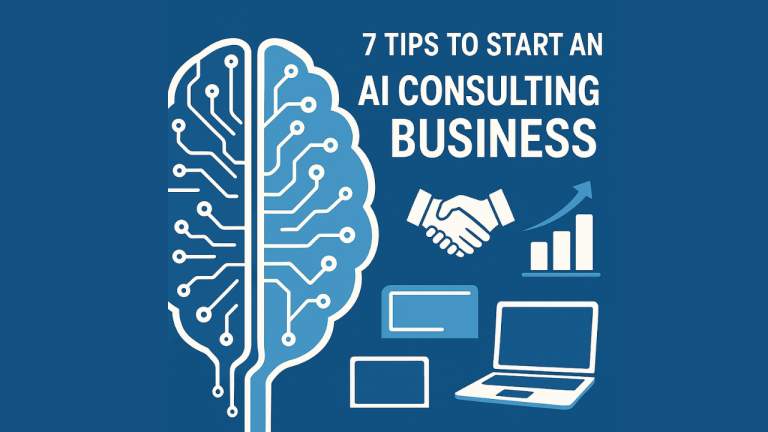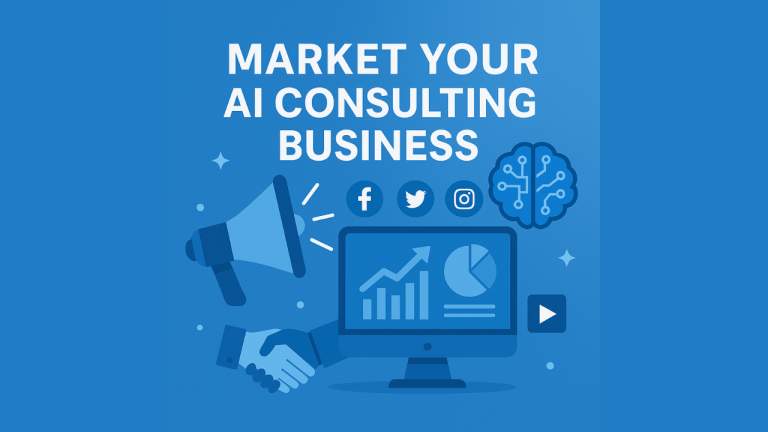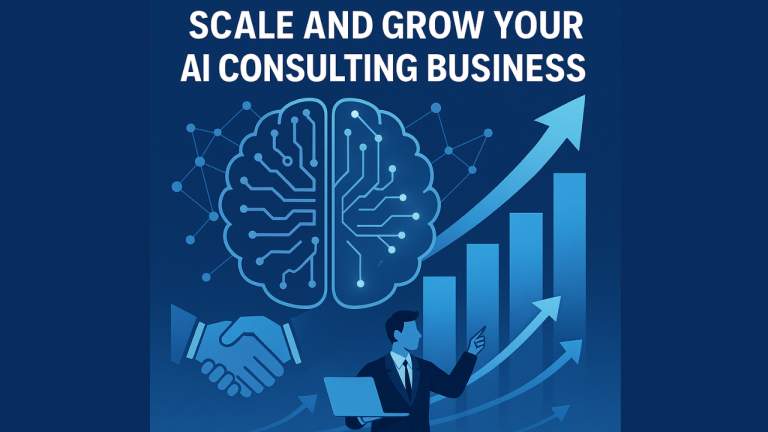
Embarking on an AI Consulting Business allows you to help organizations harness artificial intelligence to solve real‑world problems, improve efficiency, and drive innovation. As AI adoption accelerates across industries, there’s never been a better time to build a consultancy that guides clients through strategy, implementation, and ongoing optimization.
1.1. What Is an AI Consulting Business?
This business module provides expert guidance on selecting, integrating, and managing AI technologies—such as machine learning models, natural‑language processing, and computer vision—to meet specific client goals. Consultants assess data readiness, design AI solutions, and oversee deployment to ensure measurable impact.
1.2. Why Start an AI Consulting Business as a Beginner?
As a beginner, launching an AI Consulting Business lets you capitalize on soaring demand for AI expertise while building a scalable service model. With basic technical know‑how and a structured approach, you can deliver high‑value projects, establish credibility, and grow your revenue without needing a large upfront investment.
Now that you understand the opportunity in an AI Consulting Business, let’s choose the niche where you’ll make the biggest impact.
Choose Your Niche in AI Consulting Business
Selecting a clear niche is vital for standing out and attracting your ideal clients in this business. A well‑defined focus lets you tailor services, build deeper expertise, and market yourself more effectively.
2.1. AI Consulting Business Market Analysis
- Research Industry Trends: Use tools like Google Trends and industry reports to identify sectors investing heavily in AI (e.g., healthcare, finance, retail).
- Evaluate Competition: Analyze existing AI consultants—what services do they offer, at what price point, and which gaps can you fill?
- Assess Client Pain Points: Survey potential clients or join niche forums to discover their top AI challenges (data quality, model deployment, cost control).
2.2. Identifying Profitable Services
- Data Strategy & Preparation: Many organizations struggle to prepare clean, structured data for AI—offering data‑engineering services can command premium rates.
- Custom Model Development: Building bespoke machine‑learning or NLP models tailored to a client’s unique dataset.
- AI Integration & Automation: Implementing off‑the‑shelf AI APIs (e.g., computer vision, chatbots) into existing workflows to boost efficiency.
- Ongoing Optimization & Support: Providing model monitoring, retraining, and performance‑tuning as a recurring subscription service.
By focusing on a specific industry and service set within your AI Consulting Business, you’ll differentiate yourself, streamline your marketing, and deliver greater value to your clients.
With your niche defined, it’s time to acquire the technical and soft skills needed to excel in that area.
Acquire Essential Skills
Building a successful AI Consulting Business requires both solid technical know‑how and strong business acumen. Below are the core competencies you’ll need to deliver high‑value AI projects and win client trust.
3.1. Technical Competencies
- Programming & Frameworks: Proficiency in Python (NumPy, pandas, scikit‑learn) or R, plus experience with TensorFlow or PyTorch for model building.
- Data Engineering: Skills in SQL, ETL pipelines, and data‑wrangling tools to clean, normalize, and structure client datasets.
- Machine Learning & Statistics: Understanding of supervised/unsupervised learning, model evaluation metrics, and statistical hypothesis testing.
- AI APIs & Cloud Services: Hands‑on with OpenAI, AWS SageMaker, Google Cloud AI, or Azure ML—knowing how to integrate and customize prebuilt models.
- MLOps & Deployment: Familiarity with Docker, Kubernetes, CI/CD workflows, and monitoring tools to deploy and maintain models in production.
3.2. Business & Soft Skills for Success
- Industry Domain Knowledge: Deep understanding of your chosen niche (e.g., finance, healthcare) so you can translate AI capabilities into real business outcomes.
- Project Management: Ability to scope work, set milestones, manage budgets, and keep stakeholders aligned using Agile or Scrum methodologies.
- Communication & Storytelling: Clear presentation of technical concepts and data insights to non‑technical executives, backed by compelling visuals.
- Problem‑Solving & Critical Thinking: Structured approach to dissecting client challenges, designing tailored AI solutions, and iterating based on feedback.
- Sales & Relationship Building: Skills in proposal writing, pricing negotiations, and nurturing long‑term client partnerships to secure recurring engagements.
Mastering these technical and interpersonal skills will position your AI Consulting Business to deliver impactful AI solutions, foster client confidence, and scale sustainably.
Once you’ve built your core competencies, you can package them into clear, market‑ready service offerings.
Define Service Offerings
Clearly packaged services help prospects understand the value your AI Consulting Business delivers and simplify their buying decision. In this section, you’ll learn how to structure your service bundles and set prices that reflect your expertise.
4.1. Packaging
- Discovery & Assessment Package
- What it includes: Data audit, stakeholder interviews, feasibility report
- Benefit: Clients see clear ROI projections before committing to full development
- Proof‑of‑Concept (PoC) Package
- What it includes: Rapid prototype of one AI feature (e.g., chatbot, predictive model)
- Benefit: Demonstrates quick wins and builds trust with a low‑risk engagement
- Full‑Scale Implementation Package
- What it includes: End‑to‑end solution development, deployment, and training
- Benefit: Delivers a production‑ready AI system with thorough documentation
- Managed Services & Support Package
- What it includes: Ongoing model monitoring, performance tuning, and updates
- Benefit: Ensures long‑term accuracy and stability, turning one‑off projects into recurring revenue
4.2. Pricing Strategies
- Value‑Based Pricing
- Charge based on the business impact (e.g., % uplift in revenue or cost savings) rather than hours worked.
- Example: “We take 10% of the first year’s projected AI-driven efficiency gains.”
- Tiered Retainer Model
- Offer Silver/Gold/Platinum tiers for managed services, each with predefined SLA, response times, and monthly hours.
- Encourages clients to upgrade as they see value.
- Fixed‑Price for PoCs
- Provide transparent, upfront pricing for proof‑of‑concept engagements to reduce decision friction.
- Example: “$5,000 for a 4‑week PoC.”
- Hourly & Time & Materials (T&M)
- Use a standard hourly rate for ad‑hoc consulting or exploratory work outside package scopes.
- Ensure clear estimates and caps to manage client expectations.
By carefully defining your AI Consulting Business service packages and adopting strategic pricing models, you’ll make it easy for clients to choose you and ensure your fees properly reflect the value you deliver.
After your services and pricing are locked in, you need the right tools and legal framework to deliver them reliably.
Set Up the Infrastructure
A solid operational backbone lets your AI Consulting Business deliver services reliably and scale efficiently. Focus on the right tools, platforms, and legal foundations before you take on your first client.
5.1. Tools & Platforms
- Project Management: Use Asana or Trello to track deliverables, milestones, and client feedback across AI projects.
- Data & Code Repositories: Host code on GitHub or GitLab and manage datasets in cloud storage (AWS S3, Google Cloud Storage) with proper version control.
- Collaboration & Communication: Leverage Slack or Microsoft Teams for real‑time updates and Zoom for client workshops and demos.
- AI Development Environment: Standardize on JupyterLab or VS Code with virtual environments (conda, venv) and containerization (Docker) to ensure reproducibility.
- Billing & Invoicing: Automate your finance with tools like QuickBooks or FreshBooks—set up recurring invoices for retainer clients and track project expenses.
5.2. Legal & Administrative Setup
- Business Registration: Choose an appropriate legal structure (LLC, sole proprietorship, or company) based on liability and tax considerations in your jurisdiction.
- Contracts & Agreements: Prepare Master Service Agreements (MSA), Statements of Work (SOW), and NDAs that clearly define scope, deliverables, timelines, and IP ownership.
- Insurance & Compliance: Obtain professional liability (E&O) insurance to cover consulting errors and ensure you comply with data‑privacy regulations (GDPR, CCPA) when handling client data.
- Accounting & Taxation: Set up a dedicated business bank account, implement bookkeeping practices, and engage an accountant to manage invoicing, payroll (if hiring), and tax filings.
- Brand & Website: Secure a professional domain, host a simple website showcasing this business services, case studies, and client testimonials to build credibility.
By establishing the right operational tools and legal frameworks, you’ll ensure your AI Consulting Business runs smoothly, protects both you and your clients, and is poised for sustainable growth.
With your operations humming, the next step is to attract clients by marketing this business module effectively.
Marketing

Effective marketing is key to attracting clients for your AI Consulting Business. Focus on channels that showcase your expertise and build trust in your niche.
6.1. Digital Marketing Channels for AI Consulting Business
- Content Marketing & SEO
- Publish blog posts and whitepapers on AI use‑cases in your niche.
- Optimize each piece around “AI Consulting Business” and related long‑tail keywords (e.g., “AI consulting business for healthcare”).
- LinkedIn Outreach
- Share case studies and insights in LinkedIn articles and posts.
- Use Sales Navigator to identify decision‑makers in target industries and send personalized connection requests.
- Webinars & Online Workshops
- Host free webinars on AI strategy or hands‑on demos.
- Promote via email and social ads to capture leads interested in your AI Consulting Business services.
- Industry Partnerships & Guest Speaking
- Partner with industry associations to speak at virtual conferences.
- Write guest articles for respected tech or niche‑specific publications, linking back to your consultancy site.
- Paid Advertising
- Run Google Ads targeting keywords like “AI consulting business services” and “hire AI consultant.”
- Use retargeting ads on LinkedIn or Facebook to re‑engage website visitors.
6.2. Building Credibility and Case Studies in AI Consulting Business
- Develop Portfolio Case Studies
- Document each project: client background, challenge, AI solution, and measurable results (e.g., “20% cost reduction”).
- Publish them on your website under “AI Consulting Business Success Stories.”
- Client Testimonials & Reviews
- Request short video or written testimonials highlighting the impact of your AI Consulting Business work.
- Feature these prominently on your homepage and marketing materials.
- Certifications & Thought Leadership
- Earn recognized certifications (e.g., Google Cloud AI Engineer, AWS ML Specialty) and display badges on your site.
- Contribute to industry forums, answer questions on platforms like Stack Overflow, and position yourself as a go‑to expert.
- Free Tools & Templates
- Offer downloadable AI readiness checklists or data‑audit templates in exchange for email sign‑ups.
- This builds your mailing list and demonstrates your AI Consulting Business expertise upfront.
By leveraging targeted digital channels and showcasing real‑world results, you’ll raise awareness of your AI Consulting Business, generate qualified leads, and convert prospects into long‑term clients. As client work ramps up, you’ll want to automate processes and expand your team to scale your business.
Scale and Grow Your AI Consulting Business

As your AI Consulting Business gains traction, focus on automating key processes and building strategic partnerships to handle larger projects and expand your market reach.
7.1. Automating Processes in Your AI Consulting Business
- Proposal Generation: Use AI‑powered proposal tools (e.g., Better Proposals, PandaDoc) to auto‑draft customized project scopes and pricing based on client inputs.
- Client Onboarding: Implement workflow automation (Zapier, n8n) to trigger welcome emails, collect necessary data, and schedule kickoff meetings without manual effort.
- Reporting & Monitoring: Deploy dashboards that automatically pull model performance metrics and send scheduled reports to clients, freeing you from repetitive update tasks.
- Billing & Invoicing: Automate invoices and payment reminders via QuickBooks or FreshBooks integrations, ensuring timely payments and reducing administrative overhead.
7.2. Hiring & Partnerships for AI Consulting Business Expansion
- Contracting Specialized Talent: Engage freelance data scientists, MLOps engineers, or UX designers on platforms like Upwork to fill skills gaps on a per‑project basis.
- Strategic Alliances: Partner with complementary service providers—cloud platforms, analytics firms, or industry‑specific consultants—to offer bundled solutions and tap into new client networks.
- Building an In‑House Team: As revenue grows, hire full‑time consultants and project managers to maintain quality and deepen expertise in your niche.
- Referral & Affiliate Programs: Incentivize past clients and partners to refer new business by offering referral bonuses or reciprocal service credits, fueling sustained growth for your AI Consulting Business.
Having set the stage for growth, let’s wrap up with final steps to launch and sustain your AI Consulting Business.
Conclusion: Launching Your AI Consulting Business
You now have a clear roadmap to start and grow your AI Consulting Business—from choosing a niche and honing essential skills to packaging services, setting up operations, marketing effectively, and scaling with automation and partnerships.
By focusing on a specific industry, delivering measurable results, and streamlining your workflows, you’ll build credibility, attract your ideal clients, and establish a sustainable AI Consulting Business that thrives in today’s data‑driven economy.
Next Steps:
- Finalize your service packages and pricing.
- Build or update your website with case studies and clear calls to action.
- Launch a targeted marketing campaign to your chosen niche.
- Automate repeatable processes and plan for team expansion.
With these actions, your AI Consulting Business is ready to go live and make an impact.
Fell free to also read on How to Start an AI‑Powered Ecommerce Store




